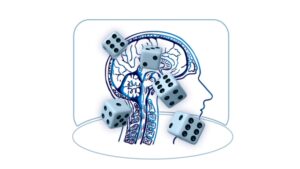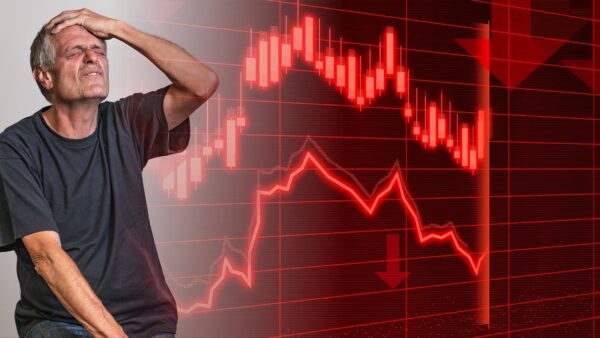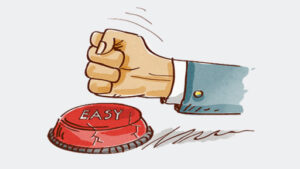
Judge Your Decisions, By Your Decisions.
At the risk of this post sounding like a book review, I

Share this post
Not wanting to be wrong is one of the most frequent issues I see traders struggle with. Whether it’s having too strong a bias pre-market and being unable to let go of it when the market says that’s not what’s going to happen, or refusing to get out of a trade that has demonstrated it’s wrong (or worse – adding to it!) and ultimately suffering a large amount of financial pain.
And believe me, I’ve been there. More times than I care to think about! But it’s not at all unusual and in fact I don’t think I’ve ever encountered a trader who didn’t wrestle with this inability to accept being wrong at some point in their trading.
I think it’s fair to say that most of us have probably been raised in an environment where we were discouraged from making mistakes or being wrong – possibly even punished when we were. Parents, teachers, coaches, friends… everyone always seems to be there ready to attack us any time we get anything less than perfect. I was fortunate enough to go to a private school until I was about 10 years old, where there were no grades, no tests, and no homework (Montessori). But boy, once I hit the public school system I was in for a brutal awakening. Mistakes were simply not permitted. If you didn’t understand something, answered incorrectly, or got anything less than “average” results on a test (a C grade), you were humiliated, ridiculed, often even punished. And sadly this doesn’t seem to have changed in the last 40 years, in fact if anything I think it’s gotten worse with the most absurd expectations of academic performance.
In the real world (i.e. outside of academia), things don’t work this way. I will argue that we human beings only learn through making mistakes. We don’t learn from books, lectures, videos, etc. We may acquire knowledge and information and that’s very good and valuable, but that’s not learning. We learn through applying the knowledge we have, to a given situation, and seeing what the outcome is. If it’s positive, we consider our actions “good”, and if the outcome is negative, we consider them “bad” (which is actually not the best way to think of it and is called “resulting”, but that’s an entirely other conversation I’ll save for another time!)
This is especially true of any learned skill that requires repetition and practice to refine. Consider riding a bicycle, swimming, golf, playing a musical instrument, or – yes – trading. These are all learned skills, and they absolutely require the ability to recognize when you’re wrong about something, and make adjustments immediately. Of course the difference is if you play a wrong note on the trumpet, you don’t lose money from it!
A musician has to recognize things like being off tempo, out of tune, not hitting the right notes or tone, their volume, etc. A golfer has to recognize when the wind has shifted, or the sun is going to be in their eyes at a particular time of day, or that the weather is changing, or that their stance is off, etc. And of course a trader has a lot of ways they can be wrong and if they intend to stay in the game for long, they better react to them quickly and decisively or their account equity will suffer.
But as previously mentioned, we’ve been conditioned that being wrong is bad, and so it feels really terrible when we’re wrong. Since trading is so often a solo endeavor these days, we have the lovely ability to hide the fact that we’re wrong. Nobody knows what we’ve done. We can just deny it. Pretend it doesn’t exist, fall back on confirmation bias to show us only the things that confirm our original idea, and ignore all the much larger things screaming at us that we’re wrong because it would feel bad.
Another aspect of not wanting to be wrong is when I see people try to take a highly subjective art (which is mostly what trading is), and turn it into an objective science. They want to be able to for example, rate the price action. Or score the correlation of the last week. Or in any number of different ways turn the subjective, objective. This doesn’t work. I mean, sure anyone can come up with a rating system based on anything. That’s easy. But it’s meaningless and just scratches our own ego when we can tell ourselves we know something. You know, because numbers!
In reality all this attempt to quantify things is, is us not wanting to have to acknowledge that we were wrong. If we lose on a trade, it’s not our fault… the indicator said to do something! The score was good! The algo let me down! All ways of not having to take responsibility for our decisions, process, etc. All to avoid having to actually say “I was wrong.”
Now really, what’s so bad about being wrong?? If you’re wrong, then you can learn something from it. If you’ve made a mistake, this is where true learning happens! You need to not shy away from these mistakes but instead embrace them, hold them close and look at them very, very carefully. Journal what happened, even just briefly, in a way that has some accountability (i.e. to a partner, in a trading group, etc.). If you can, even record your trades so that you can review them after the fact (and if you do, make sure you’re talking out loud the whole time during them too). You’ll probably find that you learn much more from the losing trades, than the winning ones.
Survival as a trader simply requires being comfortable in uncertainty, and being able to accept when you’re wrong quickly and effortlessly. It’s going to happen. In fact it’s going to happen quite a lot. So the quicker you learn to embrace it and keep your errors from costing you too much, the better your chances for a long-term existence as a trader!
Until next time, good trading!
Jonathan van Clute
Community Manager, Trading Research Group
Share this post
You Might Also Be Interested In:

At the risk of this post sounding like a book review, I

As I write this, it’s mere hours away from the clock striking

Well seeing as how it’s “the day after Black Friday” in the

There is a risk of loss in futures, forex and options trading. There is risk of loss trading futures, forex and options online. Please trade with capital you can afford to lose. Past performance is not necessarily indicative of future results. Nothing in this site is intended to be a recommendation to buy or sell any futures or options market. All information has been obtained from sources, which are believed to be reliable, but accuracy and thoroughness cannot be guaranteed. Readers are solely responsible for how they use the information and for their results. Trading Research Group does not guarantee the accuracy or completeness of the information or any analysis based thereon.
Hypothetical performance results have many inherent limitations, some of which are described below. No representation is being made that any account will or is likely to achieve profits or losses similar to those shown; in fact, there are frequently sharp differences between hypothetical performance results and the actual results subsequently achieved by any particular trading program. One of the limitations of hypothetical performance results is that they are generally prepared with the benefit of hindsight. In addition, hypothetical trading does not involve financial risk, and no hypothetical trading record can completely account for the impact of financial risk of actual trading. for example, the ability to withstand losses or to adhere to a particular trading program in spite of trading losses are material points which can also adversely affect actual trading results. There are numerous other factors related to the markets in general or to the implementation of any specific trading program which cannot be fully accounted for in the preparation of hypothetical performance results and all which can adversely affect trading results.
This presentation is for educational purposes only and the opinions expressed are those of the presenter only. All trades presented should be considered hypothetical and should not be expected to be replicated in a live trading account.
Testimonials and reviews appearing on this website may not be representative of other clients or customers and is not a guarantee of future performance or success.
© 2022 Make Ticks LLC dba Trading Research Group. All rights reserved. TickMaker™ is a trademark of Make Ticks LLC.